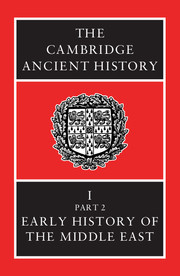Book contents
- Frontmatter
- Contents
- List of Maps
- List of Tables
- List of Text-figures
- Preface
- CHAPTER XI THE EARLY DYNASTIC PERIOD IN EGYPT
- CHAPTER XII THE LAST PREDYNASTIC PERIOD IN BABYLONIA
- CHAPTER XIII THE CITIES OF BABYLONIA
- CHAPTER XIV THE OLD KINGDOM IN EGYPT AND THE BEGINNING OF THE FIRST INTERMEDIATE PERIOD
- CHAPTER XV PALESTINE IN THE EARLY BRONZE AGE
- CHAPTER XVI THE EARLY DYNASTIC PERIOD IN MESOPOTAMIA
- CHAPTER XVII SYRIA BEFORE 2200 B.C.
- CHAPTER XVIII ANATOLIA, c. 4000–2300 b.c.
- CHAPTER XIX THE DYNASTY OF AGADE AND THE GUTIAN INVASION
- CHAPTER XX THE MIDDLE KINGDOM IN EGYPT: INTERNAL HISTORY FROM THE RISE OF THE HERACLEOPOLITANS TO THE DEATH OF AMMENEMES III
- CHAPTER XXI SYRIA AND PALESTINE c. 2160–1780 b.c.
- CHAPTER XXII BABYLONIA, c. 2120–1800 B.C.
- CHAPTER XXIII PERSIA, c. 2400–1800 B.C.
- CHAPTER XXIV (a) ANATOLIA, c. 2300–1750 B.C.
- CHAPTER XXIV(b) ANATOLIA IN THE OLD ASSYRIAN PERIOD
- CHAPTER XXV ASSYRIA, c. 2600–1816 B.C.
- CHAPTER XXVI(a) GREECE, CRETE, AND THE AEGEAN ISLANDS IN THE EARLY BRONZE AGE
- CHAPTER XXVI(b) CYPRUS IN THE EARLY BRONZE AGE
- CHAPTER XXVII IMMIGRANTS FROM THE NORTH
- BIBLIOGRAPHIES
- Chronological Tables
- Index to Maps
- General Index
- Map 6. Babylonia and Western Persia.
- Map 12. Early Bronze Age sites in Greece and the Aegean Islands.
- Map 16. Map to illustrate movements of northern peoples in the third to first millennia B.C.
- References
CHAPTER XXVI(a) - GREECE, CRETE, AND THE AEGEAN ISLANDS IN THE EARLY BRONZE AGE
Published online by Cambridge University Press: 28 March 2008
- Frontmatter
- Contents
- List of Maps
- List of Tables
- List of Text-figures
- Preface
- CHAPTER XI THE EARLY DYNASTIC PERIOD IN EGYPT
- CHAPTER XII THE LAST PREDYNASTIC PERIOD IN BABYLONIA
- CHAPTER XIII THE CITIES OF BABYLONIA
- CHAPTER XIV THE OLD KINGDOM IN EGYPT AND THE BEGINNING OF THE FIRST INTERMEDIATE PERIOD
- CHAPTER XV PALESTINE IN THE EARLY BRONZE AGE
- CHAPTER XVI THE EARLY DYNASTIC PERIOD IN MESOPOTAMIA
- CHAPTER XVII SYRIA BEFORE 2200 B.C.
- CHAPTER XVIII ANATOLIA, c. 4000–2300 b.c.
- CHAPTER XIX THE DYNASTY OF AGADE AND THE GUTIAN INVASION
- CHAPTER XX THE MIDDLE KINGDOM IN EGYPT: INTERNAL HISTORY FROM THE RISE OF THE HERACLEOPOLITANS TO THE DEATH OF AMMENEMES III
- CHAPTER XXI SYRIA AND PALESTINE c. 2160–1780 b.c.
- CHAPTER XXII BABYLONIA, c. 2120–1800 B.C.
- CHAPTER XXIII PERSIA, c. 2400–1800 B.C.
- CHAPTER XXIV (a) ANATOLIA, c. 2300–1750 B.C.
- CHAPTER XXIV(b) ANATOLIA IN THE OLD ASSYRIAN PERIOD
- CHAPTER XXV ASSYRIA, c. 2600–1816 B.C.
- CHAPTER XXVI(a) GREECE, CRETE, AND THE AEGEAN ISLANDS IN THE EARLY BRONZE AGE
- CHAPTER XXVI(b) CYPRUS IN THE EARLY BRONZE AGE
- CHAPTER XXVII IMMIGRANTS FROM THE NORTH
- BIBLIOGRAPHIES
- Chronological Tables
- Index to Maps
- General Index
- Map 6. Babylonia and Western Persia.
- Map 12. Early Bronze Age sites in Greece and the Aegean Islands.
- Map 16. Map to illustrate movements of northern peoples in the third to first millennia B.C.
- References
Summary
DEFINITION OF THE INQUIRY
The Bronze Age in lands bordering the Aegean Sea was a period of roughly two millennia that followed the age of Neolithic cultures. The name is not perfectly accurate; men did begin to use metals more or less systematically in this time, but chief among them at the outset was natural copper, not yet deliberately alloyed with tin. None the less the phrase has useful connotations, reflecting the Greek memory of an older γενος μεροπων ανθρωπων χαλκειον, and it is firmly established. The terms Chalcolithic and Copper Age, logical and correct in themselves, are now best reserved for Anatolia and other areas where their meanings have won acceptance.
As a source of confusion the name of the metal is of minor consequence. More perplexing are the formidable quantities of material remains that have been gathered in three generations of archaeological research, for they beckon the student of this area to conclusions more positive than are in fact justified. Since written records are lacking in Greece during the early period with which we are here concerned, one must rely upon stratification and comparison of objects at the known sites in order to establish a relative chronology. An approach to absolute dates may be made through proven relationships with Egypt and Mesopotamia, but these are few in number and less exact than one is often led to suppose. New and promising methods of dating, including particularly the process of radiocarbon (C–14) analysis, are still in experimental stages and the results they yield must be regarded objectively.
- Type
- Chapter
- Information
- The Cambridge Ancient History , pp. 771 - 807Publisher: Cambridge University PressPrint publication year: 1971
References
- 3
- Cited by

